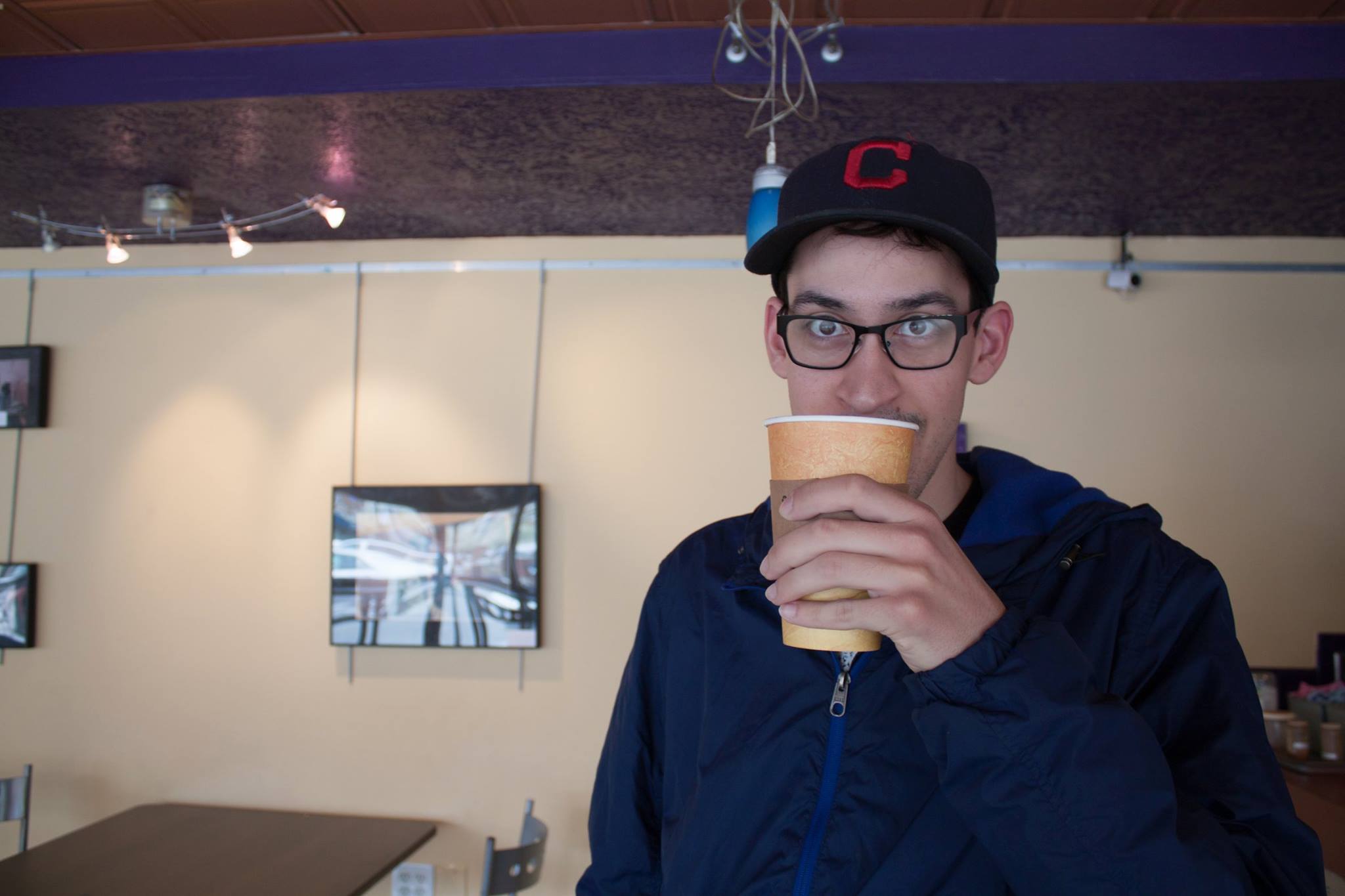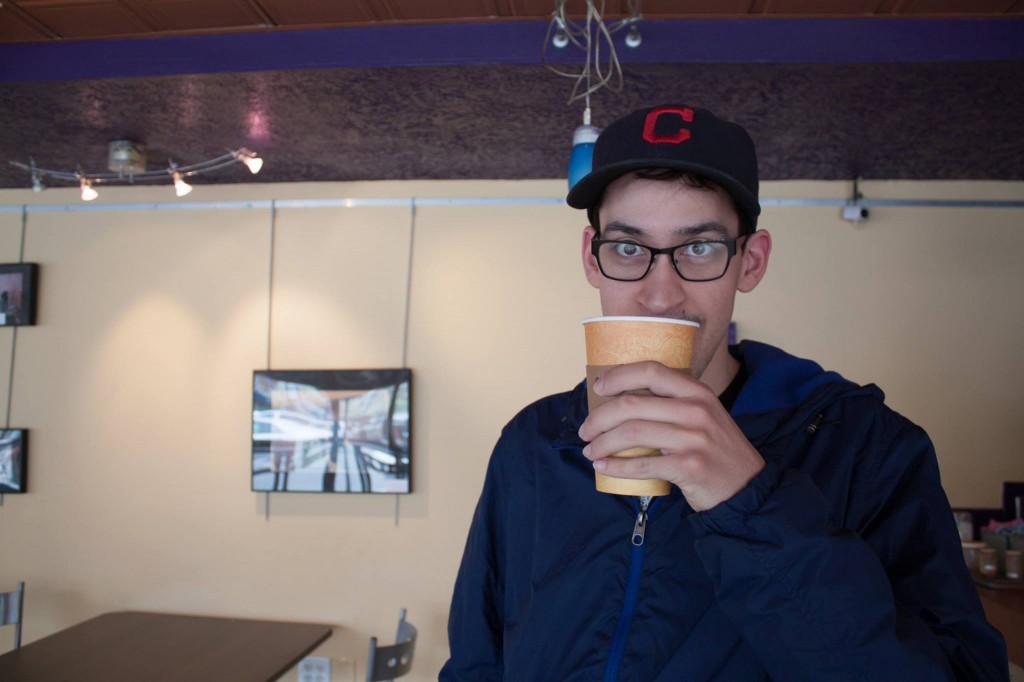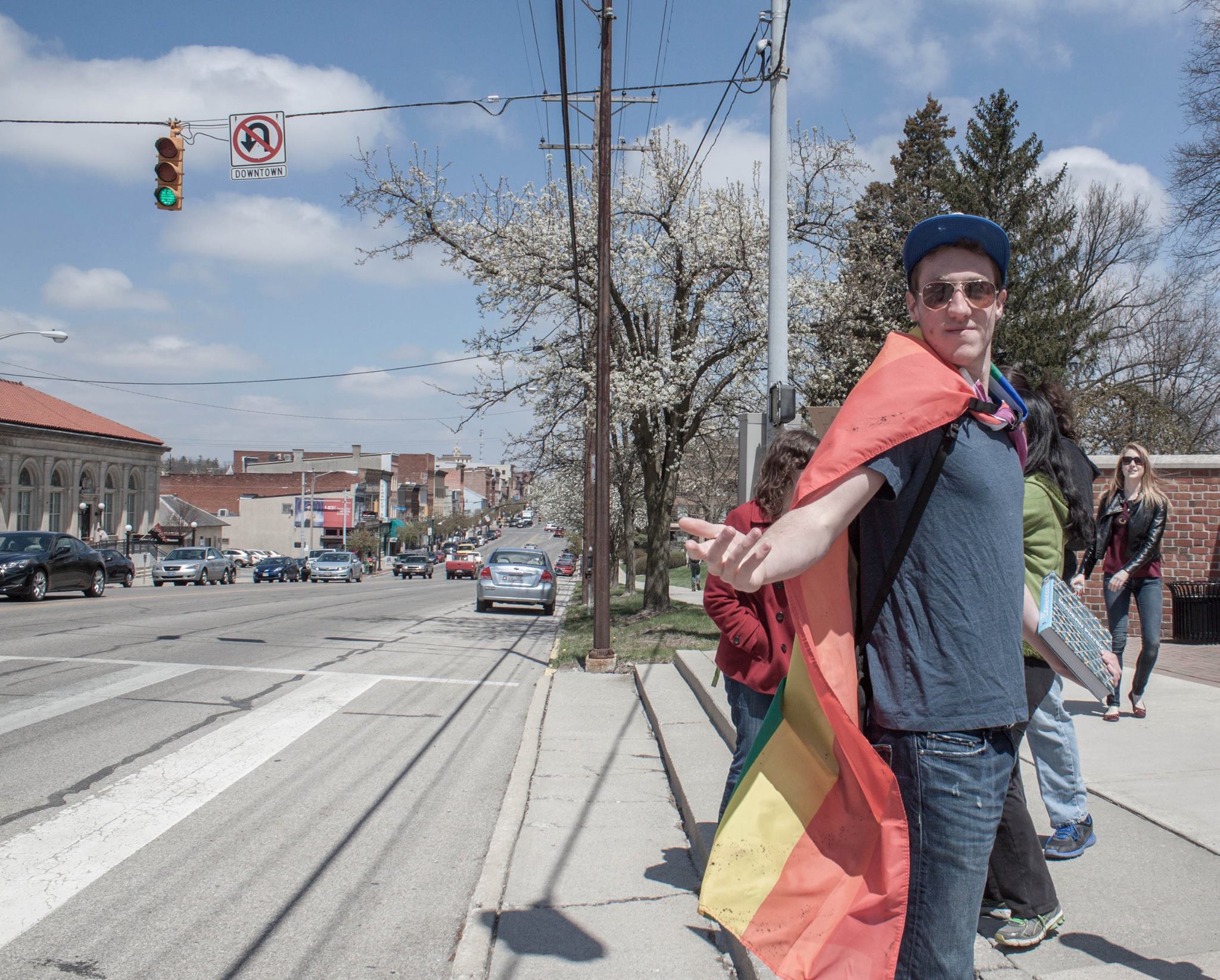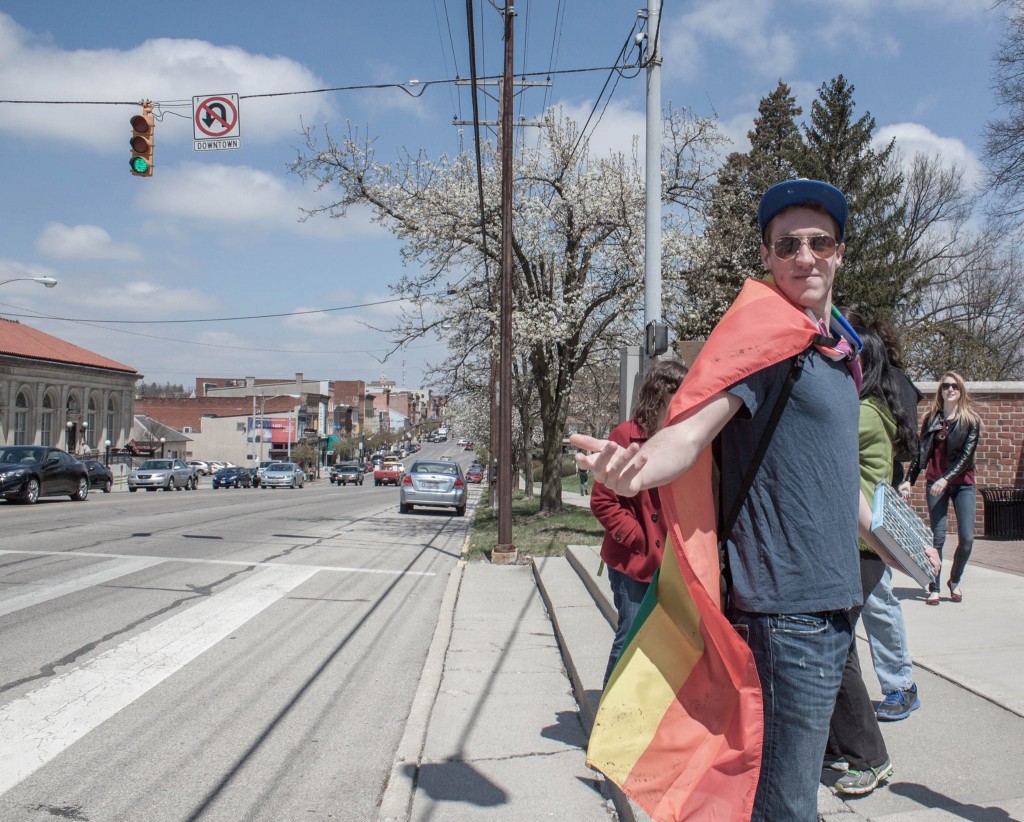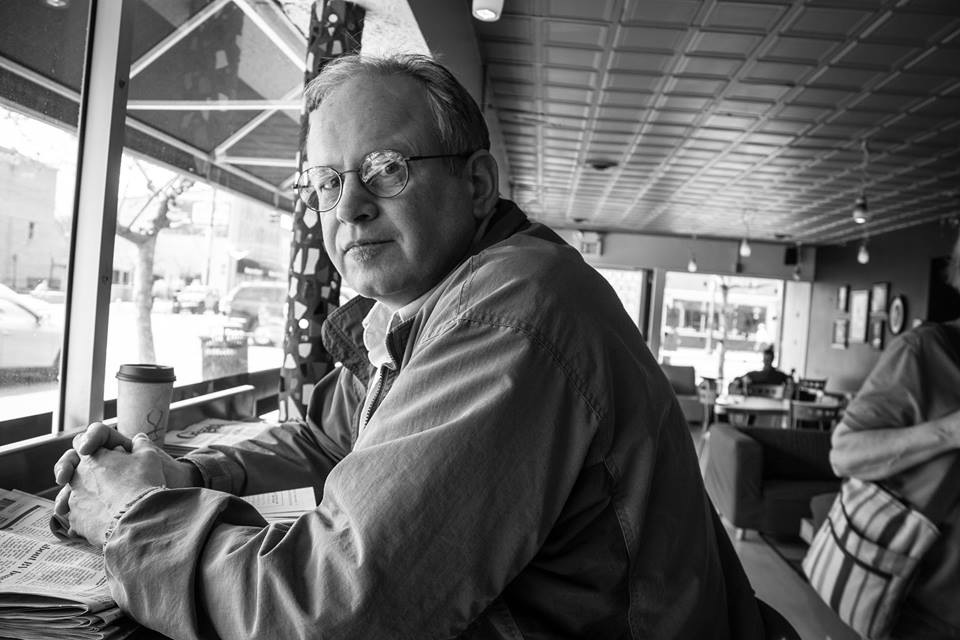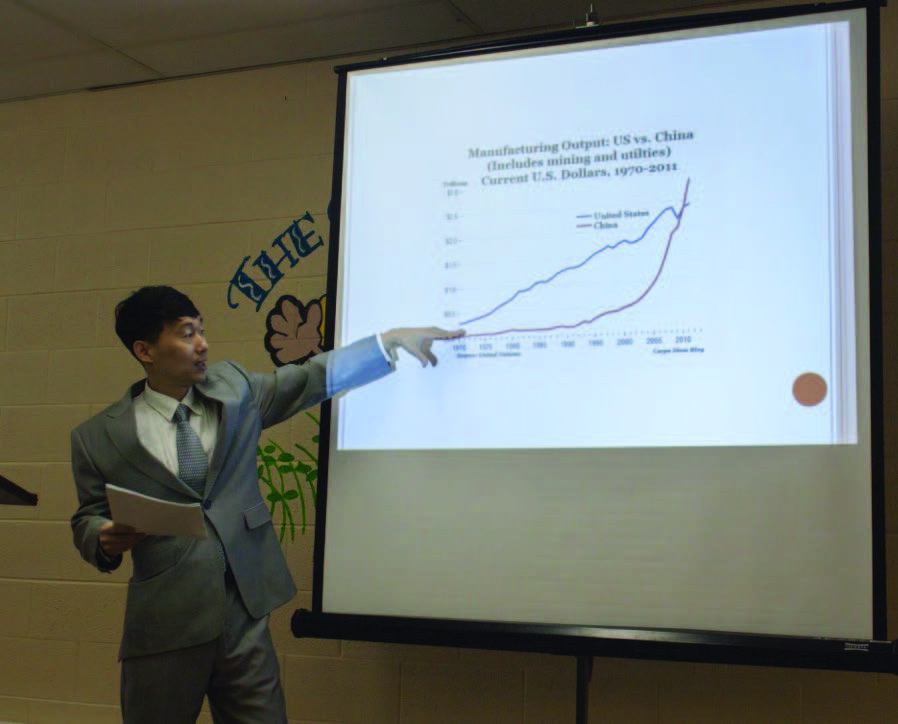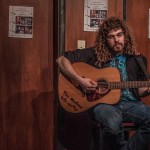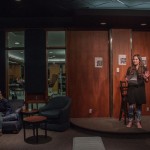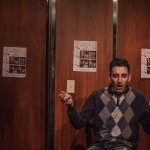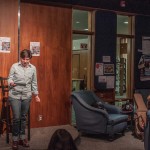Author: Katy Diane Tuggle
People of Delaware – May 1, 2014
Seen in Delaware, Ohio – junior Josh Denison sports a rainbow-colored flag.
Photo by Caleb Dorfman
People of Delaware on Facebook
People of Delaware
“What was your happiest memory?”
“Marrying my wife. I’m a widow now.”
Professor discusses gaps in China’s superstrength
Ji Young Choi, OWU politics and government professor, explains the rise of China’s power and economic status during the March 7 installment of the Great Decisions lecture series.
According to Ji Young Choi, China might develop the largest economy in the world, but that doesn’t mean it will become the number one global superpower.
Choi, a politics and government professor at Ohio Wesleyan, gave a lecture on the rise of China for the Great Decisions lecture series on March 7.
According to Choi, China has a lot of weaknesses, both internal and external, that could prevent the country from becoming the top global superpower.
Choi said the United States currently holds that position when it comes to gross domestic product (GDP) and military strength. China comes in second.
“The total gross domestic product for China in 2012 was $18.4 trillion,” Choi said.
However, according to Choi, China’s income per capita is only about $9,000. This is far behind the United States’, which was about $28,000 in 2012, according to the U.S. Census Bureau.
Another internal problem that negatively affects China, according to Choi, is the country’s location.
“(Its) number one problem is the geography,” Choi said in the lecture.
“(China) does not have access to sea (trade) routes, nor do they have many allies on any of their borders. Many of their neighboring countries are allies of the United States,” he added.
Choi explained that sea trade routes are necessary for a country to import and export goods, such as natural resources and raw materials.
Other problems that Choi thinks are contributing to China’s inability to become a dominant superpower include the country’s environmental issues, overwhelming population and domestic political instability.
A Closer Look at Chinese Youth
One audience member brought up the problem of “brain drain,” where China’s highly-educated youth go to study overseas and do not return to China.
Choi said “brain drain” is an issue because China spends a lot of money to educate its youth, but then they go to Western nations and to study and end up staying there because they enjoy the culture and lifestyle.
However, not all of China’s young people are escaping the country.
According to Choi, there is a fairly large percentage of the country’s youth population that is developing more of a sense of nationalism.
Choi said China’s political system has drifted away from communism, and that the country could now be more accurately described as an “authoritarian-capitalist” system.
“It seems to be working out pretty well so far,” Choi said.
Choi proffered several ways in which China could improve its global standing to get closer to becoming the top international superpower.
“China needs to change its ideology,” he said. “For the past couple of decades, they have had somewhat of a superiority complex.”
Expert on ‘most trusted man’ trusts AP
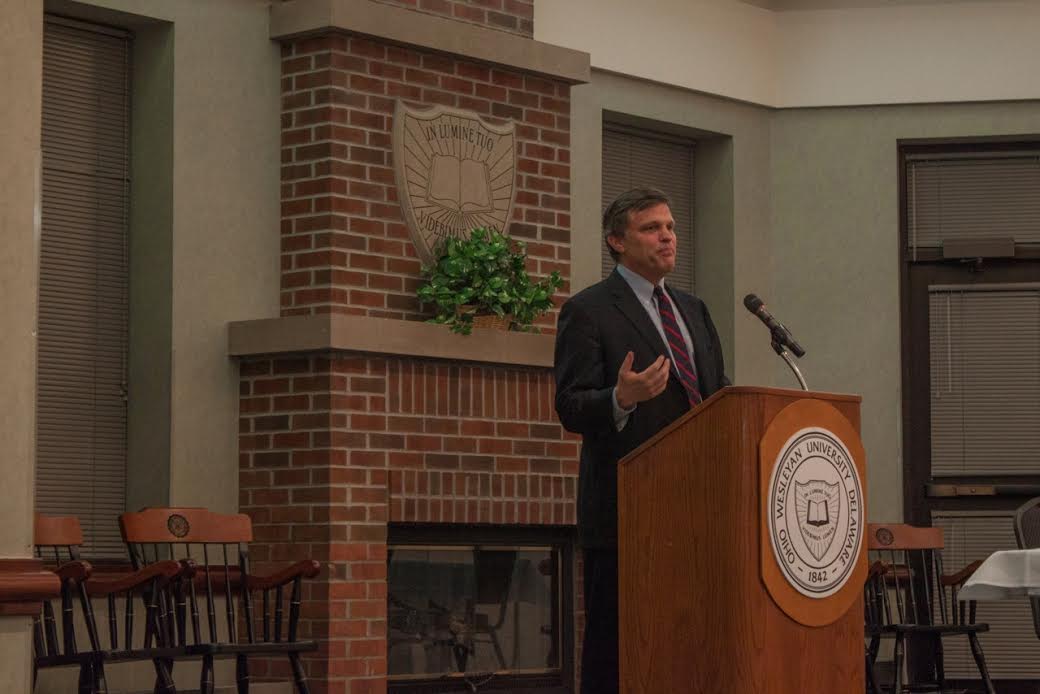
Famed historian and educator Douglas Brinkley, Ph.D., spoke to Ohio Wesleyan students, as well as Delaware city residents last Thursday as this year’s guest speaker for the John Kennard Eddy Memorial Lecture Series.
Brinkley spoke about his latest book, Cronkite, which details the life of Walter Cronkite, the broadcast journalist dubbed by many as “the most trusted man in America.”
Brinkley also discussed the rise of Cronkite’s career, which started with radio and moved into television.
Cronkite’s influence also extended to the public’s opinion on controversial topics, such as the inception of NASA and the Vietnam War.
Following the lecture, Brinkley answered questions from the audience, mediated by Politics & Government professor, Sean Kay.
Some of the questions ranged from, “Which news source does [Brinkley] believe to be the most honest and accurate,” to questions on the 24 hour news cycle, which, according to Brinkley, started with CNN in the early 1980s.
Brinkley also said the news source he trusted the most is the Associated Press.
Junior Avery Winston said he thought it was a very good, informative talk.
“I liked how he used Walter Cronkite to talk about decades of American history,” said Winston.
The John Kennard Eddy Memorial Lecture on World Politics, was founded by OWU student John K. Eddy’s parents after their son was killed in a car crash in 1988.
Chartwells makes strides in nutrition, but falls flat
Access to nutritional information for food and drink items offered by Chartwells is limited to those who have smartphones at Ohio Wesleyan University.
Those without such devices are left in the dark about what they’re eating and drinking.
According to a Pew Research poll conducted in May 2013, 79 percent of 18-24 year olds in the US have a smartphone.
The remaining 21 percent of young people without smartphones are without access to Chartwell’s nutritional information app.
According to Gene Castelli, Chartwells’ manager at Ohio Wesleyan University, nutrition information is available through an app called, AppOnCampus, which is available for iOS and Android devices.
While the app does provide nutritional information for food items that are prepared daily at Smith Hall’s Pulse on Dining, and the Hamilton-Williams Marketplace, not everyone on campus can access this information on the go.
Despite Chartwells’ website, (dineoncampus.com) offering the same nutritional information that is provided through the app, it is inconvenient for students without smartphones to access this information.
Junior Kate Hudson said, “I most likely won’t go to the cafeteria to look at [the] food, leave to find a computer to get the facts just to come back again to buy my food.”
Many students who do not have smartphones are saying that they would prefer a print out of nutrition facts for food items and have them displayed near the food.
“There have been plenty of times when I would have liked to know the nutritional info,” said sophomore Cecilia Smith. “And it’s true that if you’re on the spot with a dumb phone, that information isn’t going to be found.”
Smith added, “I’d much rather have the information right in front of me. I hate being the person who has to ask, ‘Oh, do you know what’s in this?’”
Nutrition facts for many food items not available to anyone, even with the app on their smartphones.
Students seeking the nutritional facts for any food item bought anywhere but Smith or the Ham-Wil food court, such as at the University Cafe or the Science Center Food Cart, are flat out of luck. These locations do not disclose the nutritional information of the food they carry.
Other locations where the nutritional facts of food is unknown include the Stuyvesant Hall Cafe, and the cafe in Beeghly Library.
Both the app and the website only provide nutrition facts for the coffee and espresso beverages on the menu.
“With the myriad of fresh offerings made on campus and venues we have across campus, this is the first big major push for items to carry nutritional information,” Castelli said.
“We will continue to build on this in an effort to continue to provide culinary information to our guests.”
Assistant Professor Christopher L. Fink, chairman of the Department of Health and Human Kinetics, said he believes Chartwells’ ought to post nutrition information at each location.
“I think that having information available at the site of purchase would be the best option, since online information requires students to take several steps to access that data,” Fink said. “Steps that probably only the most interested students would take.”
‘Culture Cafe’ draws low turnout
Students, faculty, and a Ohio Wesleyan alumna explored various creative outlets at this semester’s Culture Cafe.
Attendance was fewer than for September’s Culture Cafe, however Peter Szabo, music and public services librarian who hosted the event, said he felt satisfied.
“The smaller crowd created a more intimate, supportive environment for the performers,” said Szabo.
“We had a lovely little sing along at the end to Woody Guthrie’s ‘This Land is Your Land’,” added Jillian Maruskin, Public Services librarian and co-organizer of the event. Maruskin also read a poem aloud.
Szabo said he hopes to ramp up attendance by increasing publicity and awareness.
“Facebook seems to work very well,” said Szabo. “[The small attendance] is also likely due, in part, to the fact that many students have exams coming up,” Szabo said, “Back in September, students probably had more free time.”
Maruskin said, “I loved all the performances, I can’t pick a favorite.”
Maruskin added, “Ryan Haddad’s piece was exceptionally stunning.”
Haddad, junior, preformed a monologue that was excerpted from a longer solo performance. His reading induced laughs and cheers from the crowd as he removed his shirt halfway through the comedic and adult-themed piece.
Szabo said he plans to host another Culture Cafe event in April.
